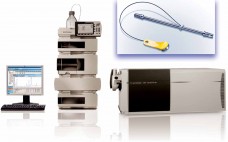Monoclonal antibodies (MAbs) are at the focal point of biologics development. Many of the best-selling drugs are therapeutic MAbs or related proteins (1–2). The combined world-wide sales from MAbs will be nearly US$125 billion by 2020 (3). About 50 MAb products treating a range of diseases have been approved in the United States or Europe. With the large number of MAbs progressing through discovery, biomanufacturers need to accelerate process development and move projects rapidly into clinical manufacturing (4–5). Formulation development,…
Author Archives: Jichao Kang
Replacing Reverse-Phase Chromatography for Mass Spectrometry: Is Salt-Free Size-Exclusion Chromatography Ready?
Protein mass is often determined using ultraperformance liquid chromatography (UPLC) coupled with electrospray-ionization mass spectrometry (UPLC/ ESI MS or simply LC-MS). A UPLC system equipped with an ultraviolet (UV) detector serves as an assisting vehicle to deliver purified and separated protein molecules to the mass analyzer. Reserved-phase chromatography (RPC) is the most common chemistry chosen to serve this purpose. For sample purification, not only does RP-UPLC use salt-free mobile phases that are amenable to MS, but it also can efficiently…
Comparing SDS-PAGE and CE-SDS for Antibody Purity Analysis
Antibody-purity analysis is critical to successful development of monoclonal antibody (MAb) biopharmaceuticals. Their manufacture involves processes of protein purification, formulation, and stability evaluation. All those processes need highly accurate and reproducible analytical results to support decisions made by product developers and manufacturers. A common technology for antibody-purity analysis is sodium-dodecyl sulfate polyacrylamide gel electrophoresis (SDS-PAGE). In this technique, a polypeptide chain binds SDS proportionally to its relative molecular mass. The detergent nature of SDS denatures proteins by disrupting their noncovalent…


